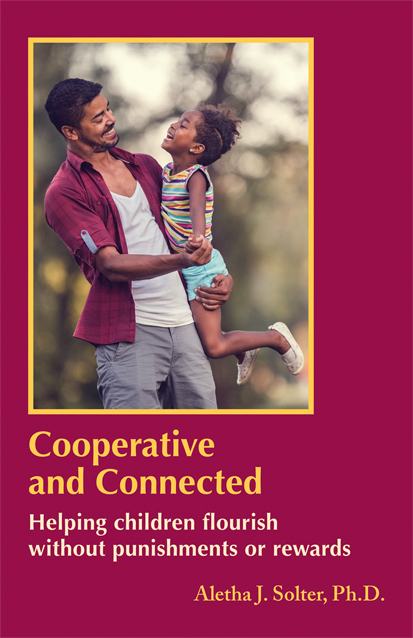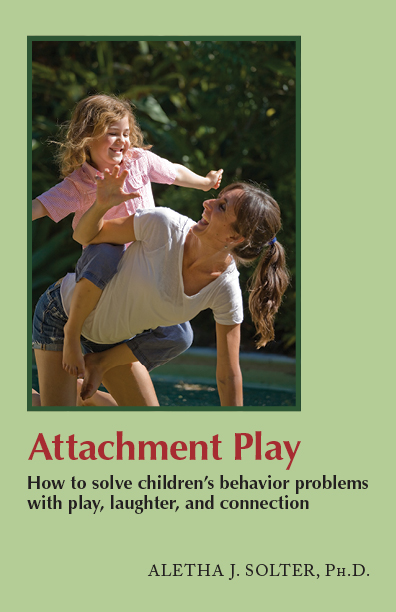Child afraid of night-time monsters
by Aletha Solter, Ph.D.
Question:
My five-year-old son has recently begun having trouble sleeping for fear of monsters (after watching a segment of the movie, "ET"). For about three months now, he has been having trouble felling asleep, and then he wakes up frightened two or three times at night. He is very astute about the world and says that it is irrational to be scared of monsters that don't exist. He knows that there are no such things, and that Mom and Dad are in the next room. The bathroom light is on, we've had our calm nighttime routine, read a book, and have some quiet music on. But he's still scared of monsters. We genuinely believe that he is scared and not just trying to get attention or something else, as he has never slept in our bed or had any problems for the previous two years sleeping in his own bed. We have tried letting him cry (alone), but we are convinced by his atypical tone that it is genuine fear. He is not interested in stuffed companions for "protection", flashlights, or any of the traditional things. We check on him every five or ten minutes at bedtime, and this works for going to sleep the first time. Any suggestions?
Answer:
Fears are very common in children between the ages of three and eight years of age. Often, they are triggered after hearing a scary story or seeing a movie, as in the case of your son. Children this age have a growing awareness of death and their own vulnerability. They feel small and powerless in a big world that is sometimes confusing and frightening. Furthermore, many children have a vivid imagination, which further contributes to their fears. Monsters become a tangible symbol for everything that feels confusing, frightening, or threatening.
Fears are aggravated by anything that poses a potential threat to children's sense of security, such as moving to a new home, starting a new school, parental stress, disputes, divorce, any kind of abuse, illness or death in the family, a mother's pregnancy, or the birth of a sibling. So if there is any unusual stress in your son's life, that would help to explain his fears.
I personally feel that movies should be screened very carefully for young children, because there are often scenes of separation, loss, danger, or violence, with frightening creatures. Most children's movies are not appropriate for children under the age of seven or eight years. But please don't blame yourself for letting your son watch ET. You had no way of knowing how it would affect him.
The fact that your son is afraid of monsters does not mean that he will grow up with phobias or anxiety disorders. Most children eventually outgrow these early fears. Your son's fears indicate that he is a sensitive child with a vivid imagination. These desirable qualities are related to compassion and creativity. Keep in mind, also, that as he grows older, you will want him to have a healthy sense of his own vulnerability. Some teenagers appear to be fearless, and they engage in risky behaviors. Perhaps they were told too often as children that there was nothing to be afraid of.
Most children feel less fearful when a parent is nearby. They have a legitimate need to be physically close to somebody who will protect them against all imagined dangers. Forcing children to stay alone in their room when they are terrified does not help, and sometimes only aggravates the situation.
I encourage you to continue your system of checking on him every five or ten minutes at bedtime. It gives him the reassurance he needs. If it stops working, there is no harm in sitting with your child in his room until he falls asleep. You can install a comfortable chair and lamp in his room, and get some reading done until he falls asleep. He will probably go to sleep much more quickly this way than if you try to force him to be alone.
When your son wakes up frightened during the night, you can let him finish the night in your room, perhaps in a sleeping bag on a mat next to your bed (or snuggled in bed with you, if you are comfortable with this). This may be the only way that you and your family will get enough sleep until your son's fears subside. He may even be able to go to sleep more easily in his own room if he has the reassurance that he can come to you in the night when he feels scared.
The goal, however, is to help him overcome this fear so he can sleep through the night in his own bed and go to sleep without needing you. Young children's fears can be very tenacious, and they do not respond to logic or reason, as you noticed. However, I have a few suggestions that might help:
1. Begin by acknowledging your son's fears. It is not helpful to deny children's fears or to say that there's nothing to be afraid of. You can say, "I know that you are afraid of monsters. It's a scary thought that there might be monsters in your room. It's no fun being scared. It must be really hard for you when you wake up at night." This will not reinforce his fears, but will help him feel understood.
2. Encourage your son to draw pictures of the monsters he imagines and to talk about them. This will help to demystify them. There are some good children's books about monsters that may be helpful as well. You can also discuss the movie that scared him, and answer his questions.
3. Help your son play with his fear (but without teasing him about it). By this I mean engage him in playful activities that give him a different perspective and allow him to laugh. For example, you can ask him to be a monster, while you play the role of a frightened child. Let him use costumes or masks in whatever way he wants, while you put on a mock display of fright. Get him to laugh, and let him be in control of the game. This kind of role reversal accompanied by the tension release mechanism of laughter can be very effective in helping children master their fears. He will probably enjoy these monster games and want to play them repeatedly. As he becomes bolder, you can try playing these games in the dark.
Hopefully, with your understanding and support, your son's fear of monsters will decrease.
About Aletha Solter:
Aletha Solter, PhD, is a developmental psychologist, international speaker, consultant, and founder of the Aware Parenting Institute. Her books have been translated into many languages, and she is recognized internationally as an expert on attachment, trauma, and non-punitive discipline.
Aware Parenting is a philosophy of child-rearing that has the potential to change the world. Based on cutting-edge research and insights in child development, Aware Parenting questions most traditional assumptions about raising children, and proposes a new approach that can profoundly shift a parent's relationship with his or her child. Parents who follow this approach raise children who are bright, compassionate, competent, nonviolent, and drug free.

